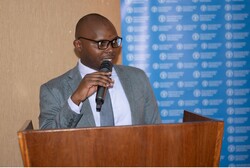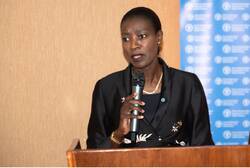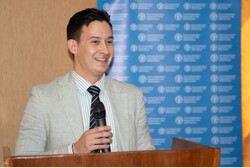FAO and partners officially close the KnoWat project in Rwanda
22 September 2022, Kigali – Participants from various institutions of the Government of Rwanda, the German embassy in Kigali, and other partners attended the final closing workshop of the KnoWat project, organized by the Food and Agriculture Organization of the United Nations.
Over the past three years, the KnoWat project has been greatly providing policy support to strengthen water governance processes in Rwanda. Also, globally the project has been working in Senegal and Sri Lanka. Through KnoWat’s support, the countries are better prepared to ensure food security and adapt to climate change, water scarcity, and increased competition for water resources in an equitable and sustainable manner.
“This project has helped us a lot in first knowing who are the water users, individuals or associations, what are their using it for and what are the best water management strategies we can deploy for better production,” said Evariste Nsabimana, Deputy Director General at Rwanda Water Resources Board (RWB).
The project has strengthened capacities in water accounting – the study of status and future trends in water supply and demand – and the assessment of water productivity – how much water is used per unit of the yield – using state-of-the-art technology using remote sensing, based on FAO’s Water Productivity through Open access of Remotely sensed derived data (WaPOR) tool. These capacities are complemented with the assessment of water tenure to deepen the understanding of access and allocation mechanisms of water resources, with the aim of protecting access rights of vulnerable populations.
“I was very much touched by testimonies of farmers in Yanze river basin, Northern Rwanda. One lady who uses solar-powered irrigation provided by the project says, irrigation is no longer labor intensive. She only switches on the machine” said Coumba Sow, FAO Representative to Rwanda.
“She now touches on cash, from vegetables and fish she sells. In her voice, other irrigation equipment used by farmers in the Yanze river basin required excessive energy and effort such that many women could hardly use them to irrigate their crops. The KnoWat helped us be well aware that inadequate irrigation schemes leave already vulnerable groups behind”.
The KnoWat project was implemented with the financial support of the Federal Republic of Germany through the Federal Ministry of Food and Agriculture.
“We are very pleased to have worked with FAO, a noble organization that is striving to transform agriculture in Rwanda and around the world. Water is life and a key driver of increasing productivity towards ending hunger” said Mr Clemens Häusler, Deputy Head of Cooperation of the German Embassy Kigali.
Mr Benjamin Kiersch, FAO’s global KnoWat Project coordinator, said their urge to successfully implement the project was triggered by adversaries facing farming in place that are prone to water scarcity.
“FAO has recently released alarming figures on water. With more than 733 million people currently living in areas of high or critical water stress and a projected 30 percent increase in global water demand by 2050, water allocation has never been more important. Agriculture is by far the largest user, accounting for 72 percent of global water withdrawals, mostly for irrigation.”
Mr Kiersch added that ”Yet, to feed a projected global population of 10 billion in 2050, agricultural production will need to increase by almost 50 percent, with much of this growth being achieved through irrigation. Worldwide about 20 % of the arable land is irrigated. On this irrigated land, about 40 % of the food is produced.”
The important results of the KnoWat project in Rwanda will inform the “Global Dialogue on Water Tenure” to be shortly launched by FAO, for the benefit of access to clean water for people all over the world, in line with the global Sustainable Development Goals.
In Rwanda, the KnoWat project has been running since 4th September 2021. It was implemented mainly in Yanze, Rulindo district, Northern Rwanda.
However, water productivity assessment and other related studies (geospatial data collection, water accounting, auditing, and water tenure) were also conducted in the Eastern Province (Muvumba and Akagera Lower). At national level, the water user and water use assessment was conducted in all 20 level 2 catchments (covering the whole of Rwanda) with the aim of exploring different scenarios of water allocation in light of increasing competition for water.
The project is directly benefitting around 245 members (85 men, 160 women) in the Yanze Catchment, Rulindo district. In addition, water resource assessment studies and results feed into the government water resource management policy framework, particularly through the Ministry of Environment (MoE), Prime Minister’s Office (Rwanda Water Resource Board) and Ministry of Agriculture (MINAGRI). Other beneficiaries are the Water and Sanitation Corporation (WASAC) and Rulindo District Water Committee who play an important role in strategic decisions around water, as well as the National Institute of Statistics in Rwanda. The beneficiaries were identified by the project technical advisory group in close collaboration with the government focal institutions.
>>> Click here for more photos
>>> Stories from the field: Harnessing source of life in Rwanda.




